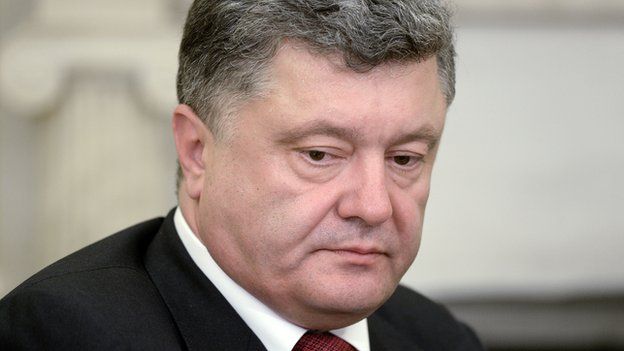Ukraine voters to pass verdict on pro-Europe politics
- Published
- comments

Sunday could be a big day for Ukrainian President Petro Poroshenko.
His nation will hold its first parliamentary elections since the Maydan protests and subsequent conflict with Russia. The Ukrainian businessman-turned-politician is expected to secure 30-35% of the vote, according to recent polls. There's a good chance he could end up with a working majority in the Rada (the Ukrainian legislature).
The elections come at a moment of internal and external crisis for Ukraine. The fighting in the country's east has been largely halted, but Russia has annexed Crimea despite Western outcry, and no one can be sure if or when the Kremlin will move to seize more Ukrainian territory.
The economy is collapsing, gas negotiations with Russia are still unsettled, and there is growing dissatisfaction with the scope and pace of reforms.
Balloting will be held across the territory of Ukraine, aside from separatist-controlled areas around Donetsk and Luhansk and the whole of Crimea.
The fact that the elections will take place at all is being called a victory for the country's very imperfect democracy, however, and an endorsement of the decision to cast Ukraine's fate with the West.
Moscow's actions have by most accounts resulted in an unprecedented burst of national self-consciousness. According to a recent poll, 52.8% of Ukrainians support their country's entry into the European Union, and more voices than in previous years are calling for entry into the Nato military alliance.
Although parties voted to return the country to the 2004 constitution after the protests, most electoral rules were not changed. Ukraine will thus operate under a system with mixed parliamentary and presidential elements, causing some uncertainty over the eventual outcome.
Formerly, the system favoured large business interests. Regional oligarchs close to the regime of former president Victor Yanukovych performed well in the constituency elections - ie, those not based on national party lists. This still may be the best hope for pro-Russian forces.
Steve Rosenberg takes the train to the Ukrainian capital, Kiev
In addition to the Poroshenko bloc, opinion polls also suggest a range of largely pro-Western parties will pass the 5% threshold needed to secure representation in the parliament.
The outcome thus is likely to be a further movement of Ukrainian politics in a westward direction.
As Ukraine experts at the Standard Bank have recently pointed out, however, even by Ukraine's fractious standards the new Rada is likely to be difficult to manage, even without a strong pro-Russian party and no communists in the parliament.
Mr Poroshenko said he hopes to consolidate power quickly. "On Monday and Tuesday we will form a new coalition - pro-European, anticorruption, without liars and populists," he said in Odessa on Thursday.
Should Ukraine's economy or security situation deteriorate further, however, Mr Poroshenko's dominance of the political centre will be difficult to maintain. Especially difficult to predict will be the balance between the so-called "party of war" and "party of peace" factions, which disagree over how to handle separatism in the east.
One possible outcome should the Poroshenko bloc fall short of a majority would be a parliamentary coalition with Oleh Lyashko's Radical Party, a new force to many foreign observers.
Mr Lyashko, a long-time political eccentric in the parliament who says he represents Ukrainian peasants and the fight against oligarchs, surprised many when he came third in the election for president of Ukraine earlier this year. He recently declined an offer to be the speaker of the Rada, saying he wants the post of prime minister to "radically change the economic situation in the country." Mr Lyashko also criticised Mr Poroshenko's peace plan.
In any post-election scenario a key factor will be the extent of Russia's continued involvement in eastern Ukraine.
"A war needs a motive ... especially for a serious war," Russian political analyst Gleb Pavlovsky said in an Echo of Moscow radio interview. "I don't see the motive for war here."
Ukrainian journalist and editor Vitali Portnikov doesn't think Russia will back down, however. He says President Vladimir Putin plans to eliminate Ukrainian statehood after the creation of the Eurasian union.
"Putin doesn't need Novorossiya (New Russia) or Crimea," he writes for the website Gordon. "He has one goal - renewal of Russia in the borders of the former USSR… The survival of the Russian political regime itself is under question now, however."
But even limited Russia intervention in the economy and energy sector of Ukraine would also be disruptive. Although Mr Putin's next move is unclear, the Russian president has indicated he will not allow Ukraine to move too far away from Russia, a view that likely will contradict the wishes of the majority of the Ukrainian voters going to the polls on Sunday.
(By Nataliya Jensen)